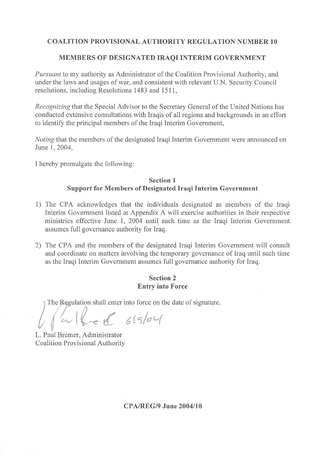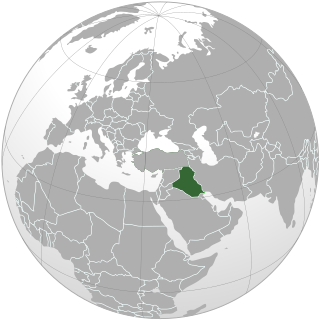
Iraqi sovereignty was interrupted by the multinational forces which overthrew Saddam Hussein in the 2003 invasion of Iraq.

United Nations Security Council resolution 1546, adopted unanimously on 8 June 2004, after reaffirming previous resolutions on Iraq, the Council endorsed the formation of the Iraqi Interim Government, welcomed the end of the occupation and determined the status of the multinational force and its relationship with the Iraqi government.

United Nations Security Council Resolution 1700, adopted unanimously on August 10, 2006, after recalling previous resolutions on Iraq, particularly resolutions 1500 (2003), 1546 (2004), 1557 (2004) and 1619 (2005), the Council extended the mandate of the United Nations Assistance Mission in Iraq (UNAMI) for a further period of twelve months until August 10, 2007.

The United Nations Assistance Mission for Iraq (UNAMI) was formed on 14 August 2003 by United Nations Security Council (UNSC) Resolution 1500 at the request of the Iraqi government to support national development efforts.
United Nations Security Council Resolution 1790 was adopted unanimously by the United Nations Security Council on December 18, 2007, extending the mandate of the multinational force in Iraq until December 31, 2008. The mandate had been established in 2004 by Security Council resolution 1546 and previously extended by resolutions 1637 and 1723.

United Nations Security Council Resolution 1637, adopted unanimously on 8 November 2005, after reaffirming previous resolutions on Iraq, the Council extended the mandate of the multinational force until the end of 2006.

United Nations Security Council Resolution 1905, adopted unanimously on December 21, 2009, after noting the letter from Prime Minister of Iraq Nouri al-Maliki, the Council extended until 31 December 2010 the arrangements for depositing proceeds from oil and gas export sales into the Development Fund for Iraq, established under Resolution 1483 (2003).

United Nations Security Council resolution 1360, adopted unanimously on 3 July 2001, after recalling all previous resolutions on Iraq, including resolutions 986 (1995), 1284 (1999), 1330 (2000) and 1352 (2001) concerning the Oil-for-Food Programme, the Council extended provisions relating to the export of Iraqi petroleum or petroleum products in return for humanitarian aid for a further 150 days.

United Nations Security Council Resolution 1933, adopted unanimously on June 30, 2010, after reaffirming resolutions 1893 (2009), 1911 (2010) and 1924 (2010) on the situation in Côte d'Ivoire and Resolution 1885 (2009) on the situation in Liberia, the Council extended the mandate of the United Nations Operation in Côte d'Ivoire (UNOCI) and supporting French forces until December 31, 2010, and expanded UNOCI's mandate with provisions to strengthen its capacity to consolidate stability in the country.
United Nations Security Council resolution 1444, adopted unanimously on 27 November 2002, after reaffirming all resolutions on the situation in Afghanistan, particularly resolutions 1386 (2001) and 1413 (2002) and resolutions 1368 (2001) and 1373 (2001) on terrorism, the council extended the authorisation of the International Security Assistance Force (ISAF) for a period of one year beyond 20 December 2002.

United Nations Security Council Resolution 1936, adopted unanimously on August 5, 2010, after recalling all previous resolutions on the situation in Iraq, including resolutions 1500 (2003), 1546 (2004), 1557 (2004), 1619 (2005), 1700 (2006), 1770 (2007), 1830 (2008) and 1883 (2009), the Council extended the mandate of the United Nations Assistance Mission in Iraq (UNAMI) for a further period of 12 months, until July 31, 2011.

United Nations Security Council resolution 1491, adopted unanimously on 11 July 2003, after recalling resolutions 1031 (1995), 1088 (1996) and 1423 (2002) on the conflicts in the former Yugoslavia, the Council extended the mandate of the Stabilisation Force (SFOR) in Bosnia and Herzegovina for a further period of twelve months.

United Nations Security Council resolution 1510, adopted unanimously on 13 October 2003, after reaffirming all resolutions on the situation in Afghanistan, particularly resolutions 1386 (2001), 1413 (2002) and 1444 (2002), and resolutions 1368 (2001) and 1373 (2001) on terrorism, the council extended the authorisation of the International Security Assistance Force (ISAF) for a period of one year and expanded its operations outside the capital Kabul to other areas.

United Nations Security Council resolution 1511 was adopted unanimously on 16 October 2003, after reaffirming previous resolutions on Iraq, particularly 1483 (2003), 1500 (2003), and Resolution 1373 (2001) on terrorism. The council urged countries to contribute towards a multinational force to maintain security and called for power to be returned to the Iraqi people as soon as possible.

United Nations Security Council Resolution 1956, adopted unanimously on December 15, 2010, after recognising positive developments in Iraq since the adoption of 661 (1990), the Council terminated UN supervised arrangements for the Development Fund for Iraq with effect from June 30, 2011.

United Nations Security Council Resolution 1655, adopted unanimously on January 31, 2006, after recalling previous resolutions on Israel and Lebanon, including resolutions 425 (1978), 426 (1978) and 1614 (2005), the Council extended the mandate of the United Nations Interim Force in Lebanon (UNIFIL) for a further six months until July 31, 2006.

United Nations Security Council Resolution 1707, adopted unanimously on September 12, 2006, after reaffirming all resolutions on the situation in Afghanistan, particularly resolutions 1386 (2001), 1413 (2002), 1444 (2002), 1510 (2003), 1563 (2004), 1623 (2005) and 1659 (2006) and resolutions 1368 (2001) and 1373 (2001) on terrorism, the Council extended the authorisation of the International Security Assistance Force (ISAF) until mid-October 2007.

United Nations Security Council Resolution 1728, adopted unanimously on December 15, 2006, after reaffirming all resolutions on the situation in Cyprus, particularly Resolution 1251 (1999), the Council extended the mandate of the United Nations Peacekeeping Force in Cyprus (UNFICYP) for six months until June 15, 2007.

United Nations Security Council Resolution 2001, adopted unanimously on July 28, 2011, after recalling all previous resolutions on the situation in Iraq, including resolutions 1500 (2003), 1546 (2004), 1557 (2004), 1619 (2005), 1700 (2006), 1770 (2007), 1830 (2008), 1883 (2009) and 1936 (2010), the Council extended the mandate of the United Nations Assistance Mission in Iraq (UNAMI) for a further period of 1 year.
United Nations Security Council Resolution 1859 was unanimously adopted on 22 December 2008.

















